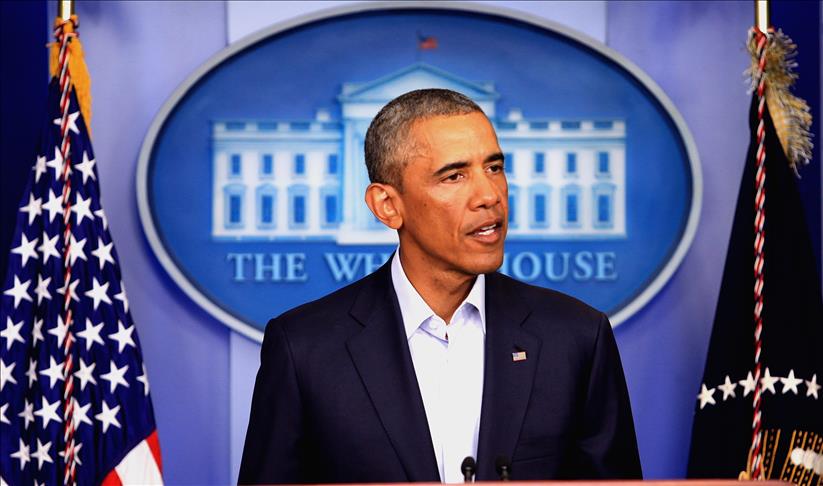
By Kasim Ileri and Ilgin Karlidag
WASHINGTON/BRUSSELS
President Barack Obama's call this week for NATO to fortify its southern front has been interpreted by some as an attempt to get the alliance to assume a role in helping to end the Mideast turmoil.
At a White House press conference with NATO Secretary-General Jens Stoltenberg, Obama directed the attention of NATO members to the risk of potential spillover of the Middle East turmoil and noted the importance of the alliance's partnering with countries and organizations in the region.
“That means increased defense capacity-building with other countries like Iraq or GCC countries that are interested in working with us, as well as the African Union,” he said referring to the Gulf Cooperation Council.
Some experts describe the president's remarks as an effort to push the alliance into the fight against Daesh as the U.S.-led coalition seems to have failed to stop the militants’ advancement, evident in the group’s capture of Iraq’s Anbar province's key city of Ramadi and the momentum it still maintains in Syria with the recently takeover of the ancient city of Palmyra in northern Aleppo.
Others, however, say Obama’s message to allies was directed at those focused solely on the Russian threat and blind to threats from other fronts.
Michael Rubin, an international security expert at the American Enterprise Institute told Anadolu Agency that Obama's comments were more of "a recognition of the instability and danger which persists in the region" rather than a call for a new interventionist mechanism.
He argued that the recent upsurge of Daesh and the failure of the coalition to stop the militants might have led the American president to push for more serious European involvement.
"Obama's philosophy has always been to ‘lead from behind’ and so he's hoping that NATO can take the lead in any operation," Rubin said.
He also pointed out that Obama specifically mentioned Libya at his press conference in order to highlight the spillover concern of many European powers as the turmoil in Libya has direct effects on the continent due to its geographical proximity.
"This is one of the reasons why Obama hopes the NATO [read the Europeans] can step up," Rubin said.
The U.S. top commander in Europe, Gen. Philip Breedlove, recently told Congress that in addition to a refugee influx, there is a major concern about terrorists' infiltration into Europe among the refugees.
At the alliance’s summit in Wales last September, leaders decided to create a new military force that would be capable of responding to new challenges on the alliance’s southern and eastern borders.
The Spearhead Force is supposed to be ready to deploy 5,000 land troops in less than 48 hours to the area when demanded. Though not created specifically to deal with the migration and infiltration issue, the force could be called on to assist in responding to the threat.
Obama’s call for strengthening regional cooperation would presumably include the bolstering some existing initiatives launched by the alliance such as the Istanbul Cooperation Initiative that Turkey pioneered in 2004 during the NATO summit in Istanbul and the Mediterranean Dialogue from 1994.
Both of these initiatives encourage allies to partner with the regional powers to maintain stability in the region and contribute to counterterrorism efforts.
NATO's involvement in Africa and the Middle East is also not new. Including intervention in Libya in 2011, the organization has conducted several operations from its southern front.
Thus, some experts say that Obama's emphasis on the southern front was not a hint or a call for a new operation or intervention but instead a message that addressed the differences among the allies in terms of priorities.
"Obama's emphasis on the southern front is a message to the NATO's members who solely focus on Ukrainian crisis," said Soner Cagatpay, director of the Turkish Research Program at the Washington Institute for Near East Policy.
"He means indeed if you just focus on the crisis in Ukraine you will fail to see the threats and problems emerging in other regions."
Obama's concern was articulated by the then outgoing Defense Secretary Chuck Hagel during his final speech at NATO headquarters in Brussels in February.
Hagel expressed concern about a possible division within the alliance, claiming northern NATO countries want to focus more on what they perceive as a threat from Russia, while southern members like Spain and Italy are worried about the crisis in Africa and the Middle East.
"I am very concerned by the suggestion that this alliance can choose to focus on only one of these areas as our top priority," he said. "And I worry about the potential for division between our northern and southern allies."
Anadolu Agency website contains only a portion of the news stories offered to subscribers in the AA News Broadcasting System (HAS), and in summarized form. Please contact us for subscription options.







